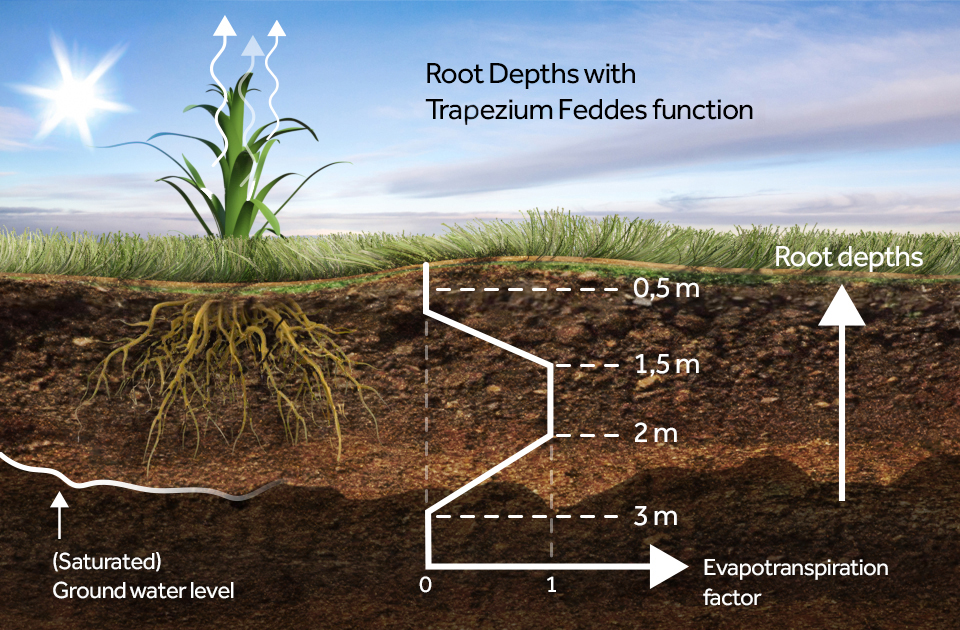Root depth m (Water Overlay): Difference between revisions
No edit summary |
No edit summary |
||
| (8 intermediate revisions by the same user not shown) | |||
| Line 4: | Line 4: | ||
|attribute=ROOT_DEPTH_M | |attribute=ROOT_DEPTH_M | ||
|unit=m | |unit=m | ||
|range=0 to {{halfmaxvalue}} | |||
|functionvalue=Depth of plant roots (m) | |functionvalue=Depth of plant roots (m) | ||
|description=The depth of the roots of this Building, relative to the terrain height at the location of this Building. Water can be drawn from the ground and evaporated if the roots can reach it. | |description=The depth of the roots of this Building, relative to the terrain height at the location of this Building. Water can be drawn from the ground and evaporated if the roots can reach it. | ||
| Line 10: | Line 11: | ||
}} | }} | ||
Buildings with a root depth are known as crops and foliage. | Buildings with a [[Depth of plant roots (Function Value)|root depth]] are known as crops and foliage. | ||
[[Building]]s representing crops and foliage can draw water from the [[Ground model (Water Overlay)|ground]], allowing it to [[ground evaporation formula (Water Overlay)|evaporate]]. This behaves in the same way as [[terrain]] which is configured as [[terrain root depth m (Water Overlay)|plants]]. | [[Building]]s representing crops and foliage can draw water from the [[Ground model (Water Overlay)|ground]], allowing it to [[ground evaporation formula (Water Overlay)|evaporate]]. This behaves in the same way as [[terrain]] which is configured as [[terrain root depth m (Water Overlay)|plants]]. | ||
====Feddes Trapezium==== | ====Feddes Trapezium==== | ||
{{:Feddes trapezium}} | |||
{{article end | {{article end | ||
| Line 30: | Line 26: | ||
* [[How to add and remove an Attribute]] | * [[How to add and remove an Attribute]] | ||
|seealso= | |seealso= | ||
* [[Terrain root depth m ( | * [[Depth of plant roots (Function Value)]] | ||
* [[Terrain root depth m (Water Overlay)]] | |||
* [[Ground evaporation formula (Water Overlay)]] | * [[Ground evaporation formula (Water Overlay)]] | ||
* [[Groundwater level formula (Water Overlay)]] | * [[Groundwater level formula (Water Overlay)]] | ||
Latest revision as of 15:21, 27 February 2024
| Icon | Attribute | Unit | Range | Description |
|---|---|---|---|---|
| |
ROOT_DEPTH_M | m | 0 to 65519 | The depth of the roots of this Building, relative to the terrain height at the location of this Building. Water can be drawn from the ground and evaporated if the roots can reach it. |
Buildings with a root depth are known as crops and foliage.
Buildings representing crops and foliage can draw water from the ground, allowing it to evaporate. This behaves in the same way as terrain which is configured as plants.
Feddes Trapezium
Plants can experience oxygen stress when the groundwater level is too high. The plant roots become saturated so that the plant can no longer transpire. To simulate the oxygen stress, the root depth can also be configured with four values instead of one, which will be interpreted using Feddes transpiration model. In the model, when the groundwater level rises, the transpiration increases. However, at a certain point, the groundwater is too high and the transpiration decreases. Water on the surface can then still evaporate, but the plant cannot transpire anymore.
The sequence for the four values should be defined in order of largest to smallest depth values and are interpreted as a 0-1-1-0 transpiration factor trapezium.
Notes
- For crops and foliage to evaporate water, both the ROOT_DEPTH_M and the WATER_EVAPORATION_FACTOR must be appropriately configured.
- When a building is present in any given location, the values for evaporation in the ground will overrule any values set by terrain in the same location. To model ground evaporation without a building, set the attributes of the building on the applicable terrain type instead.
- When a building has a ROOT_DEPTH_M of 0, the amount of evaporation which takes place in that location is 0.





